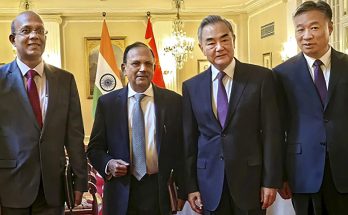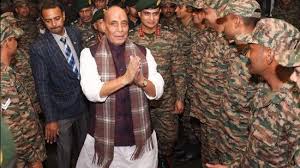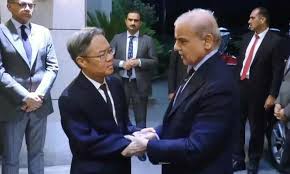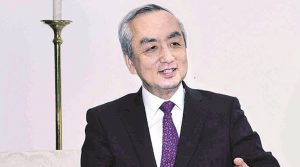
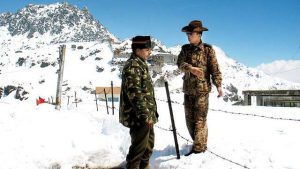
Japan’s unequivocal support for India’s stand on the Doklam crisis with China has come yet as another proof of the success of New Delhi’s diplomacy in getting its point across to other nations on the crucial issue, without getting provoked by the sound and fury in Beijing.
New Delhi’s calibrated approach is in stark contrast to China’s hasty steps and threatening noises that followed the Indian troops’ intervention to stop construction of a strategic road in Doklam which lies at the trijunction of India, China and Bhutan in the Sikkim sector, as the road would have made the PLA’s access easier to the ‘Chicken Neck’, the narrow strip of land that links India with its north-eastern states.
In the aftermath of the stoppage of the construction, China, besides issuing all kinds of threats, also tried to feed a false narrative to foreign envoys claiming that the area where the construction was taking place was inside its territory and Bhutan had no locus standi there. They also claimed that Bhutan had accepted that Doklam was their territory, which was, however, denied by Bhutan stating that it stood by its statement of June 29, which was still posted on the website of its foreign ministry.
However, there have been few ready takers for its stand except of course Beijing’s client state Pakistan, and that is perfectly understandable.
Japan’s Ambassador to India Kenji Hiramatsu recently said in an interview that the status quo on Doklam should be maintained and there should be no unilateral attempt to change it. The Japanese envoy also stressed that his country understood that the area was disputed between China and Bhutan, and that both countries recognised the existence of a dispute. “What is important in disputed territories is that all the countries involved do not resort to unilateral attempts to change the status quo by force, and resolve the dispute in a peaceful manner.” He had also said his country had been watching the situation very closely as “it can affect the stability of the region.”
“The interview speaks for itself,” India’s External Affairs Ministry spokesperson Raveesh Kumar said in New Delhi when asked about his reaction to the envoy’s comment. He, however, refused to tell specifically what Japan had conveyed to India regarding Doklam, saying that such communications were not always to be shared with media.
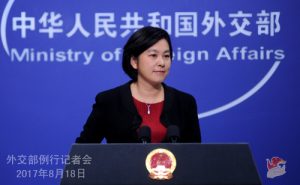 Predictably, Japan’s envoy’s remarks have been resented and denounced by Beijing, and have an added significance in the context of Japan’s Prime Minister Shinzo Abe’s visit to India around mid-September.
Predictably, Japan’s envoy’s remarks have been resented and denounced by Beijing, and have an added significance in the context of Japan’s Prime Minister Shinzo Abe’s visit to India around mid-September.
Message from US
Signals emanating from the US also indicate that India’s behaviour was being appreciated as becoming of a mature power. James R. Holmes, professor of strategy at the prestigious US Naval War College has said India had thus far has done the right thing, “neither backing away from the dispute nor replying in kind to Beijing’s over-the-top rhetoric.”
India is “behaving like a mature power” in the Doklam standoff in the Sikkim section, and making China look like an adolescent throwing a temper tantrum, he said.
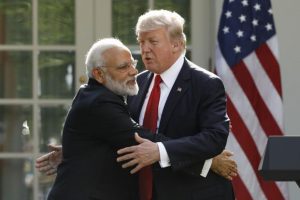 In the midst of the continuing stand-off in Doklam, the US and India also announced the elevation of their strategic partnership, staring a new 2+2 dialogue of defence and foreign ministers of the two countries.
In the midst of the continuing stand-off in Doklam, the US and India also announced the elevation of their strategic partnership, staring a new 2+2 dialogue of defence and foreign ministers of the two countries.
“US President Donald Trump and Prime Minister Narendra Modi have resolved to enhance peace across the Indo-Pacific region by establishing a new 2-by-2 ministerial dialogue that will elevate their strategic consultation,’’ said a readout from the White House of the conversation that took place between Prime Minister Narendra Modi and US President Donal Trump when the latter called him up to greet him India’s 71st Independence day.
ASEAN connect
Amid reports that India is trying to mobilise the support of friendly ASEAN countries over the Doklam issue, India also played down the reports that it was going to supply BrahMos missile to Vietnam, saying that media reports were not true and pointing out that the Vietnamese foreign Ministry had denied the report. However, there has not been any clear cut denial by Vietnam Foreign Ministry.
A Vietnam Foreign Ministry spokesperson, on being asked about the report said that the “procurement of defence equipment by Vietnam is consistent with the policy of peace and self-defence and is the normal practice in the national defence. We will forward your question to the relevant agency.” He added that the Vietnam–India comprehensive strategic partnership had been actively developing in many fields including trade, investment, economics culture, education and defence and security.
Except Japan, ASEAN countries might not have taken a clear cut stand in favour of India on the Doklam issues, but they may be finding Indian’s response to the situation very desirable. As a Hongkong-based South China Morning post quoting foreign experts said that ASEAN, “generally regards a robust Indian presence in the region as a useful deterrent against China, which has been increasingly assertive in its approach to handling territorial issues, as has been the case in the Himalayas.”
The newspaper quoted Thitinam Pongsudhirk, an international relations scholar at Bangkok-based Chulalongkorn University, as saying that, “India’s standing up to China can only be a boon for South-East Asian countries even when they don’t say so openly.”
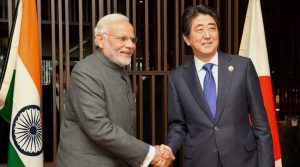 Why Soft Power matters
Why Soft Power matters
The explicit support of Japan, Asia’s second largest economy, is the first such expression of solidarity by an important Asian power for India in the wake of the Doklam stand-off. In the more than two months since the standoff between Indian and Chinese troops started on the Doklam plateau, “India’s restraint and smart diplomacy has elicited admiration and respect from major power centres, indicating growing international support for India’s position that sensitive issues like these should be resolved through dialogue, and not allowed to be hijacked by hysterical nationalist propaganda emanating from China’s state-controlled media outlets,” said Manish Chand, Editor-in-Chief of India and World, a prestigious magazine on international affairs. “In situations like these, soft power matters as much as hard power,” he said. Hope Beijing is listening in!
Author Profile
- India Writes Network (www.indiawrites.org) is an emerging think tank and a media-publishing company focused on international affairs & the India Story. Centre for Global India Insights is the research arm of India Writes Network. To subscribe to India and the World, write to editor@indiawrites.org. A venture of TGII Media Private Limited, a leading media, publishing and consultancy company, IWN has carved a niche for balanced and exhaustive reporting and analysis of international affairs. Eminent personalities, politicians, diplomats, authors, strategy gurus and news-makers have contributed to India Writes Network, as also “India and the World,” a magazine focused on global affairs.
Latest entries
 India and the WorldApril 23, 2025Kashmir terror: India hits back at Pakistan, highlights cross-border linkages
India and the WorldApril 23, 2025Kashmir terror: India hits back at Pakistan, highlights cross-border linkages India and the WorldApril 23, 2025The Century of America and India: Growing Together
India and the WorldApril 23, 2025The Century of America and India: Growing Together In ConversationApril 20, 2025India Can Contribute Largely to Development of Morocco’s Defence Industry: Ambassador
In ConversationApril 20, 2025India Can Contribute Largely to Development of Morocco’s Defence Industry: Ambassador India and the WorldApril 2, 2025Mapping Next Steps for BIMSTEC
India and the WorldApril 2, 2025Mapping Next Steps for BIMSTEC





